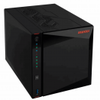Storage & RAID setup
We are testing with the NAS 4+4 bay version, you could go for a RAID setup as well. Some example setups you can manage with 4unitsbays:
- 1 x 4 TB SSD for OS and APP-related functionality to get the best performance out of the NAS.
- 3 x 4 TB set up in RAID5 for a bit of long-time storage paired with redundancy (the raid array will allow for one HDD failure).
- 1 x 4 TB set up as hot-spare. If one HDD dies, this hot-spare will kick in and repair the array to a normal functioning one. Hence that is a little extra safety for your data.
Once your setup and volume is created, initialization is finished really fast. RAID will now typically have to synchronize, this can take hours or minutes depending on volume size and the CPU performance. No worries though, as you can go on and use the NAS and even already save files. Meanwhile, feel free to play around with the features that ASUSTOR has built in, from encryption to SMART, it's all there. If you make use of HDDs, we could recommend adding two cheap small NVME SSDs for file caching.
filesystem btrfs
For your file system please do select filesystem btrfs as it will open up a feature that you'll like very much, snapshots of your storage volumes. These are an incredibly easy way to restore backups. Btrfs is a file system based on the copy-on-write (COW) principle. So it's not like you have to do snapshots, but if you'd like to use the feature, at least you already have your file system compatibility.






